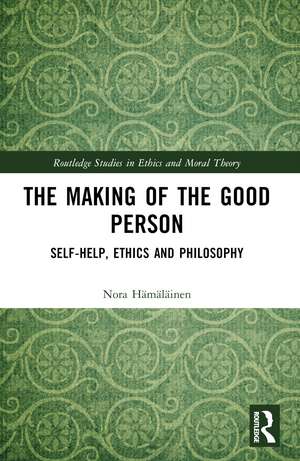The Making of the Good Person: Self-Help, Ethics and Philosophy: Routledge Studies in Ethics and Moral Theory
Autor Nora Hämäläinenen Limba Engleză Paperback – 7 oct 2024
Unlike other academic treatments of the topic of self-help, this book is not primarily concerned with providing a critique of popular self-help and self-transformative practices. Rather, it is concerned with how they work to shape contemporary forms and ideals of moral personhood and are conducive to moral renegotiation and change. The book consists of two parts with somewhat different argumentative strategies. Part 1 consists of an overview and reassessment of popular self-help literature and its sociological and journalistic critics, written from a moral philosophical perspective. Part 2 opens with discussion of the current attraction, among a range of philosophers, to self-transformative themes. The chapters assess the strand of self-transformative philosophy found in the work of Ludwig Wittgenstein, Michel Foucault, Pierre Hadot, Stanley Cavell, and Iris Murdoch. Finally, the book concludes with a discussion of the theme of social change and moral renegotiation in contemporary societies, which is a central but underestimated undercurrent in discussions on contemporary self-transformative practices. The book’s dual perspective—on both popular self-help and self-transformative currents in philosophy—enables a cultural and moral philosophical analysis of contemporary ethical ideals of personhood, as well as reflection on the literatures available for its development.
The Making of the Good Person will be of interest to scholars and advanced students working in moral philosophy, history of philosophy, psychology, sociology, and literary studies.
| Toate formatele și edițiile | Preț | Express |
|---|---|---|
| Paperback (1) | 260.72 lei 6-8 săpt. | |
| Taylor & Francis – 7 oct 2024 | 260.72 lei 6-8 săpt. | |
| Hardback (1) | 893.90 lei 6-8 săpt. | |
| Taylor & Francis – 3 apr 2023 | 893.90 lei 6-8 săpt. |
Din seria Routledge Studies in Ethics and Moral Theory
-
 Preț: 295.34 lei
Preț: 295.34 lei -
 Preț: 450.61 lei
Preț: 450.61 lei -
 Preț: 311.48 lei
Preț: 311.48 lei - 9%
 Preț: 1004.86 lei
Preț: 1004.86 lei -
 Preț: 311.51 lei
Preț: 311.51 lei -
 Preț: 309.50 lei
Preț: 309.50 lei -
 Preț: 311.41 lei
Preț: 311.41 lei -
 Preț: 325.74 lei
Preț: 325.74 lei -
 Preț: 311.06 lei
Preț: 311.06 lei -
 Preț: 313.72 lei
Preț: 313.72 lei -
 Preț: 716.43 lei
Preț: 716.43 lei - 18%
 Preț: 1112.55 lei
Preț: 1112.55 lei - 18%
 Preț: 1053.16 lei
Preț: 1053.16 lei - 18%
 Preț: 1054.89 lei
Preț: 1054.89 lei - 18%
 Preț: 1106.02 lei
Preț: 1106.02 lei - 18%
 Preț: 1058.10 lei
Preț: 1058.10 lei - 18%
 Preț: 1113.60 lei
Preț: 1113.60 lei -
 Preț: 416.22 lei
Preț: 416.22 lei - 26%
 Preț: 820.32 lei
Preț: 820.32 lei - 18%
 Preț: 1119.87 lei
Preț: 1119.87 lei -
 Preț: 382.47 lei
Preț: 382.47 lei - 30%
 Preț: 846.92 lei
Preț: 846.92 lei -
 Preț: 474.68 lei
Preț: 474.68 lei -
 Preț: 439.24 lei
Preț: 439.24 lei - 18%
 Preț: 1000.27 lei
Preț: 1000.27 lei -
 Preț: 411.42 lei
Preț: 411.42 lei - 18%
 Preț: 1057.40 lei
Preț: 1057.40 lei - 18%
 Preț: 1054.75 lei
Preț: 1054.75 lei -
 Preț: 436.14 lei
Preț: 436.14 lei - 26%
 Preț: 762.57 lei
Preț: 762.57 lei -
 Preț: 461.66 lei
Preț: 461.66 lei - 30%
 Preț: 848.57 lei
Preț: 848.57 lei -
 Preț: 408.38 lei
Preț: 408.38 lei - 18%
 Preț: 1109.18 lei
Preț: 1109.18 lei - 18%
 Preț: 1105.94 lei
Preț: 1105.94 lei - 30%
 Preț: 820.32 lei
Preț: 820.32 lei - 31%
 Preț: 763.39 lei
Preț: 763.39 lei -
 Preț: 483.20 lei
Preț: 483.20 lei - 18%
 Preț: 1109.99 lei
Preț: 1109.99 lei - 31%
 Preț: 764.22 lei
Preț: 764.22 lei -
 Preț: 449.41 lei
Preț: 449.41 lei - 18%
 Preț: 1055.51 lei
Preț: 1055.51 lei - 30%
 Preț: 848.31 lei
Preț: 848.31 lei -
 Preț: 482.17 lei
Preț: 482.17 lei -
 Preț: 428.09 lei
Preț: 428.09 lei
Preț: 260.72 lei
Preț vechi: 311.80 lei
-16% Nou
Puncte Express: 391
Preț estimativ în valută:
49.89€ • 52.09$ • 41.20£
49.89€ • 52.09$ • 41.20£
Carte tipărită la comandă
Livrare economică 15-29 aprilie
Preluare comenzi: 021 569.72.76
Specificații
ISBN-13: 9781032390116
ISBN-10: 1032390115
Pagini: 266
Dimensiuni: 152 x 229 mm
Greutate: 0.49 kg
Ediția:1
Editura: Taylor & Francis
Colecția Routledge
Seria Routledge Studies in Ethics and Moral Theory
Locul publicării:Oxford, United Kingdom
ISBN-10: 1032390115
Pagini: 266
Dimensiuni: 152 x 229 mm
Greutate: 0.49 kg
Ediția:1
Editura: Taylor & Francis
Colecția Routledge
Seria Routledge Studies in Ethics and Moral Theory
Locul publicării:Oxford, United Kingdom
Public țintă
Academic, Postgraduate, and Undergraduate AdvancedCuprins
1. Introduction Part 1: Reading the Self-help Culture 2. What is Self-help? 3. Plural Histories of Self-help 4. Self-help and Governmentality 5. We Have Always Been Governed Part 2: Philosophy as a Self-transformative Practice 6. Transformative Hopes in Philosophy 7. Pierre Hadot – Philosophy as a Spiritual Practice 8. Foucault’s Two Faces? 9. Murdoch’s Platonic Ascent 10. Wittgenstein’s Therapy 11. Cavell’s Ethics of Becoming 12. Ways Forward
Recenzii
"Hämäläinen’s book is unique in bringing out how popular self-help literature not only reflects but also shapes contemporary forms and ideals of moral personhood, being a place of constant moral renegotiation; an insight bought in dialogue with her clear analysis of philosophical concerns with self-transformation."
Anne-Marie S. Christensen, University of Southern Denmark
Anne-Marie S. Christensen, University of Southern Denmark
Notă biografică
Nora Hämäläinen is Docent and University Researcher at the University of Helsinki, Finland. She is the author of Descriptive Ethics: What Does Moral Philosophy Know about Morality? (2016) and Literature and Moral Theory (2015).
Descriere
This book provides a philosophical assessment of the idea of personhood advanced in popular self-help literature. It also traces, within academic philosophy and philosophical scholarship, a self-help culture where the self is brought forth as an object of improvement and a key to meaning, progress and profundity.
